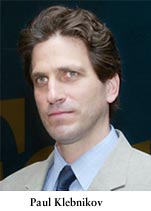New York, July 7, 2006 — Two years after the contract-style killing of Forbes Russia editor Paul Klebnikov, his assassins remain at large and judicial secrecy and procedural issues have crippled his family’s quest for justice. Klebnikov, a 41-year-old U.S. journalist of Russian descent, was shot outside his Moscow office on July 9, 2004, in direct retaliation for his investigative journalism.
The Klebnikov family filed a complaint today with the Supreme Court protesting the case’s handling in lower courts, The New York Times reported. The complaint said a trial judge in the Moscow City Court had failed to release records of the closed trial after it ended with the acquittal of two suspects on May 5. The family’s complaint also said the judge was holding up appeals of the verdict in higher courts.
“The whole process is deeply flawed, but the biggest flaw is that the proceedings have been secret,” CPJ Executive Director Joel Simon said. “We call on the Moscow City Court to unseal the trial transcript and to make sure that all future hearings are open to the public and the media.”
On May 5 this year, a jury at Moscow City Court acquitted ethnic Chechens Kazbek Dukuzov and Musa Vakhayev of Klebnikov’s murder. The four-month-long trial was held behind closed doors, and all who took part in the proceedings, including the 12 jurors, were silenced by a gag order. Court officials justified the secrecy on the grounds of classified evidence, and the safety of participants.
CPJ has confirmed that despite these measures, authorities failed to protect the jury. Jurors were not sequestered and could be easily approached as they entered or left the courtroom. Judge Vladimir Usov and other court officials did not stop the defendants or some defense representatives from making threatening statements in court that could have affected the jury.
Those and other procedural violations give reason to question the verdict. On June 28, CPJ sent a letter to U.S. President George W. Bush, outlining concerns about the handling of the case. It urged him to share those concerns with President Vladimir Putin at their July 14 summit in St. Petersburg. Read letter here: http://www.cpj.org/protests/06ltrs/americas/usa28june06pl.html
Moscow City Court officials are now effectively blocking the Klebnikov family’s appeal to Russia’s Supreme Court. The Court has yet to provide the Klebnikovs or their representatives with access to the trial transcript which they need to prepare a detailed appeal. Russia’s Law of Criminal Procedure requires that such access be given to the plaintiffs within three days; the Klebnikovs filed their request for access on May 10. Since the trial proceedings were sealed, and audio and video recording in the courtroom was prohibited, the transcript is the only document detailing the hearing.
The Prosecutor-General’s Office has yet to come forward with evidence into the alleged role of Chechen separatist leader Khozh Ahkmed Nukhayev in Klebnikov’s slaying. Russian prosecutors have said on the record that Nukhayev, the subject of a critical book Klebnikov published in 2003, is the suspected mastermind, but have remained tightlipped about the evidence they have gathered in support of that claim.
Human rights groups hope Russia’s press freedom record will come under international scrutiny when President Putin hosts this year’s Group of Eight (G8) summit of industrialized nations in St. Petersburg, beginning July 15. With a dozen unsolved contract-style murders since Putin came to office, Russia is one of the most murderous countries for journalists, according to CPJ research.
